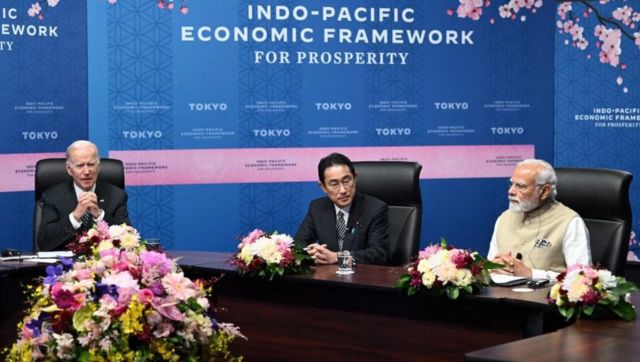The members of 14-nation bloc Indo-Pacific Economic Framework for Prosperity (IPEF), including India and China, have struck a deal on supply chains agreement, including improving logistics and connectivity as well as promoting investments in critical sectors and cooperation. This deal would help IPEF members meet future chain crises and reduce their reliance on China. According to IPEF joint statement, the grouping at their second in-person ministerial meeting in Detroit this weekend has agreed to set up an IPEF supply chain council, supply chain crisis response network and labour rights advisory network. India has joined three of the four IPEF pillars, while has been an observer in the trade pillar. India’s Commerce and Industry Minister Piyush Goyal who participated virtually in the meeting said, “Negotiations under the Supply Chains (Pillar-II) were substantially concluded; while good progress was reported under the other IPEF Pillars.” In a tweet, Goyal said: “Reiterated India’s commitment towards building resilient supply chains and a clean and fair economy to spur further growth in the region.” To facilitate cooperation among partners, the proposed IPEF Supply Chain Agreement contemplates the establishment of three new IPEF supply chain bodies. They are – the supply chain council, the supply chain crisis response network and IPEF labour rights advisory board. The IPEF members said the deal on supply chains aimed to increase the “resilience, efficiency, productivity, sustainability, transparency, diversification, security, fairness, and inclusivity of their supply chains” through collaborative activities as well individual actions by each state. Aim of supply chains agreement The proposed agreement on supply chains aims at increasing the resilience, efficiency, productivity, sustainability, transparency, diversification, security, fairness and inclusivity of the supply chains through collaborative activities and individual actions taken by each IPEF partner. The agreement would also help facilitate cooperation, mobilise investments and promote regulatory transparency in sectors “critical to national security, public health and safety, or the prevention of significant or widespread economic disruptions”; respect, promote and realise, “in good faith”, labour rights in the supply chains of partner countries; ensure availability of adequate skilled workforce in critical sectors and identify opportunities for technical assistance. The IPEF members said the agreement is meant to provide a framework to “build their collective understanding of significant supply chain risks, supported by each partner’s identification and monitoring of its own critical sectors and key goods”. It would also seek to improve crisis coordination and response to supply chain disruptions and work together to support the timely delivery of affected goods during a crisis. How will this be done? The IPEF members in the joint statement suggested said they have agreed to do so by respecting market principles, minimising market distortions, including unnecessary restrictions and impediments to trade, and protecting the confidential information of businesses. The grouping has also agreed to set up three institutions which will help in meeting these objectives. What’s next? The deal will now be translated into a final text after which it will require the domestic approval from each country. IPEF member countries 1- India 2- United States 3- Australia 4- Brunei 5- Fiji 6- Indonesia 7- Japan 8- South Korea 9- Malaysia 10- New Zealand 11- Philippines 12- Singapore 13- Thailand 14- Vietnam The IPEF was launched by the US along with other partner countries of the Indo-Pacific region including Japan, Australia and seven ASEAN members. It has been structured around four pillars - trade, supply chains, clean economy and fair economy. With inputs from agencies Read all the Latest News , Trending News , Cricket News , Bollywood News , India News and Entertainment News here. Follow us on Facebook , Twitter and Instagram .
Umang Sharma is a media professional with over 12 years of experience. Crafting compelling content and using storytelling techniques are his strengths. His interest lies in national, global, political news and events.
)